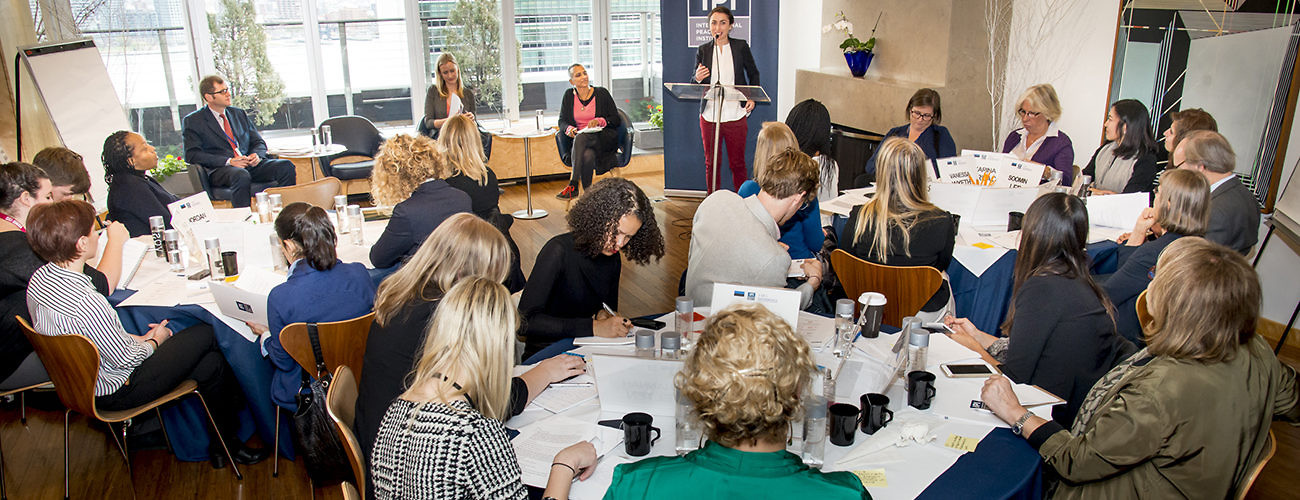A growing body of evidence reveals the central role of gender in both peace and development. The economic empowerment of women gives them the resources, status, and networks required to enter the public sphere, to launch political campaigns or engage in civic activism. Gender equality is closely linked to peacefulness and violence prevention, and lays the foundation for sustainable development. In short, an investment in inclusion is an investment in peace.
It’s time for policymakers to leverage these connectors between gender, peace, and development, particularly as they work to implement the Sustainable Development Goals. This was a key message at a workshop co-organized by IPI, Saferworld, and the Permanent Mission of Estonia, “Toward Peaceful, Just, and Inclusive Societies: Applying a Gender Perspective,” held on December 8, 2016. The workshop first asked why efforts to build peaceful, just, and inclusive societies must take gender into account, and then turned to questions of how to integrate gender in practice.
The meeting was held under the Chatham House Rule of non-attribution.
In the opening session, speakers reflected on silos that persist between peace and security, development, and gender policy communities. In 2000, two major global frameworks were adopted: the Millennium Development Goals (MDGs) and Security Council Resolution 1325 on women, peace, and security. At the time, these agendas did not speak to each other, or leverage the ample evidence that gender and peace analysis are critical for development.
Today, there are concrete links between the 2030 Agenda and the Sustainable Development Goals and the emerging framework of Sustaining Peace—adopted by the Security Council and General Assembly in 2016. They share a common vision for peaceful societies, focusing on universality and inclusivity, national ownership and leadership, long-term approaches, and participatory governance. At least thirty-six targets across the SDGs relate to nonviolence, inclusivity, and justice. The Global Study on Resolution 1325 also stressed these areas, and focused strongly on prevention as the route to sustainable peace and development.
The 2030 Agenda emphasizes that governments have the primary responsibility for progress, and that this can only be achieved through inclusive and active engagement of their citizens. The SDGs are now being translated and adopted into national policy frameworks around the world, a process that the women, peace, and security agenda has undertaken through National Action Plans (NAPs). While 63 countries now have NAPs, and these could incorporate elements of the SDGs in the future, they sometimes lack political will for implementation. The process of adopting the SDGs nationally, therefore, may bring a renewed energy and opportunity to mainstream gender under the umbrella of development policies.
Participants in the workshop discussed how to integrate a gender perspective in efforts to build peaceful and inclusive societies, how to strengthen political leadership and accountability, and suggested the following points to guide action at the global and national levels:
- Support civil society movements. Funding for women’s collective activism is decreasing in recent years, even while the space for peaceful civil society organizing is under threat in many countries. Women’s movements at the national and local level have proven the most effective in holding policymakers accountable for implementing gender equality law and commitments.
- Be more responsive. When a leader emerges or a policy window opens, the international community can be ready to provide technical expertise and political support. Policy actors can listen to women’s groups on the ground, let them take the lead, and learn from their work how to overcome silos.
- Strengthen and broaden accountability. National reporting on SDG implementation has begun at the High Level Political Forum (HLPF). Member states have signed up for voluntary reporting on particular goals, but they should be encouraged to report holistically across the SDGs and to integrate a gender perspective in all reporting. Bringing in more voices, including women’s voices, can strengthen accountability in the HLPF. This can also help ensure that reporting on national commitments does not come from government actors alone. NGO shadow reporting, such as to the Convention for the Elimination of All Forms of Discrimination against Women (CEDAW) Committee, could also be considered to broaden monitoring and analysis.
Many post-conflict transitions bring “violent peace,” where accountability and justice are lacking, where women in public service face harassment and abuse, where high levels of domestic and criminal violence persist. The 2030 Agenda offers a different vision of peaceful societies, with a focus on justice and violence prevention. Gender equality is key to achieving it.
Speakers included Ambassador Gustavo Meza-Cuadra, Permanent Representative of Peru to the UN; Ambassador Karel van Oosterom, Permanent Representative of the Netherlands to the UN; Ambassador Sven Jürgenson, Permanent Representative of Estonia to the UN; Rita Manchanda, Research Director of the South Asia Forum for Human Rights; Andrea Ó Súilleabháin, Senior Policy Analyst at IPI; Marie O’Reilly, Director of Research at Inclusive Security; Chris Murgatroyd, Policy Advisor at UNDP; and Alejandro Sousa, Senior Legal Adviser in the Office of the President of the General Assembly. To inform the discussion, Anna Möller-Loswick, Policy Officer at Saferworld, presented a new paper on ensuring a gender perspective in policy and programing to achieve Goal 16 of the SDGs.
Jimena Leiva-Roesch, Senior Policy Analyst at IPI, and Geeta Kuttiparambil, Gender Peace and Security Adviser at Saferworld, moderated the sessions.








